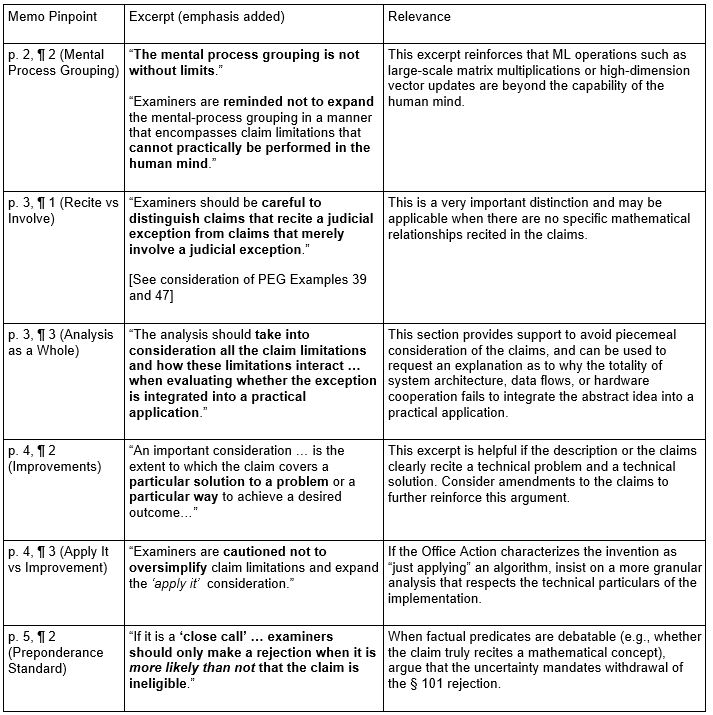
Publication
International Restructuring Newswire
Welcome to the Q3 2025 edition of the Norton Rose Fulbright International Restructuring Newswire.


Author:
Canada | Publication | August 8, 2025
Commissioner Kim issued an August 4 memorandum (Kim Memo) that clarifies how examiners should apply existing SME guidance, especially when analyzing artificial intelligence, machine learning, software, or embedded software (e.g., hardware control) claims. The memo was directed to Technology Centers 2100 (Computer Architecture Software and Information Security), 2600 (Communications), and 3600 (eCommerce).
For practitioners, this is a very useful guide for rebutting § 101 rejections and has several paragraphs to support reconsideration and argumentation. The Kim Memo narrows the circumstances under which examiners may invoke the mental-process abstract-idea category, emphasizing that claim limitations that cannot practically be performed in the human mind should not be classified as mental processes, and also provides guidance on integration into a practical application, and advises against oversimplification of the claims.
This is particularly relevant guidance for machine learning operations that involve complex computations, especially in view of a recent Federal Circuit decision and subsequent unfavourable Patent Trial and Appeal Board decisions citing the decision.
The memorandum instructs examiners to carefully distinguish between claims that merely involve a judicial exception and those that actually recite it. This distinction is crucial because claims that only involve an abstract idea do not require further eligibility analysis under Step 2A Prong One. Additionally, the Kim Memo stresses that Step 2A Prong Two must consider all claim limitations as a whole, focusing on how these limitations interact to integrate the judicial exception into a practical application. This holistic approach prevents piecemeal treatment and ensures the totality of the system architecture, data flows, or hardware cooperation is evaluated.
Examiners are cautioned against over-reliance on the “apply it” rationale, which oversimplifies claim limitations and fails to respect the technical particulars of the implementation.
The memorandum directs that a § 101 rejection should only be issued when it is more likely than not the claim is ineligible, reinforcing the preponderance standard. This means if the factual predicates are debatable, the uncertainty mandates withdrawal of the § 101 rejection.
Each of these points provides valuable advocacy supports for applicants seeking to establish patent-eligible subject matter, offering a robust
for demonstrating that their claims satisfy the requirements of the Alice/USPTO SME framework.

The Kim Memo provides applicants with authoritative language to help respond to overly expansive § 101 rejections in relation to technological advances embedded in AI and software innovations. By weaving these passages into drafting and prosecution strategies, practitioners can more persuasively demonstrate that their claims satisfy each stage of the Alice / USPTO subject matter eligibility framework. The Kim Memo guidance is helpful both for drafting patent applications and preparing responses to examiner rejections.

Publication
Welcome to the Q3 2025 edition of the Norton Rose Fulbright International Restructuring Newswire.

Publication
Our 23rd report spotlights landmark legislative reforms such as the UK’s new Arbitration Act 2025 and South Africa’s rise as a regional arbitration hub. We examine procedural innovations, enforcement challenges, and the evolving role of tribunals in promoting settlement.
Subscribe and stay up to date with the latest legal news, information and events . . .
© Norton Rose Fulbright LLP 2025